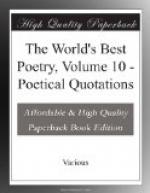The glad circles round them yield their
souls
To festive mirth, and wit that knows no
gall.
The Seasons: Summer. J. THOMSON.
As merry as the day is long. Much Ado about Nothing, Act ii. Sc. 1. SHAKESPEARE.
And frame your mind to mirth and merriment,
Which bars a thousand harms and lengthens
life.
Taming of the Shrew: Induction, Sc. 2.
SHAKESPEARE.
A
merrier man,
Within the limit of becoming mirth,
I never spent an hour’s talk withal.
His eye begets occasion for his wit.
For every object that the one doth catch,
The other turns to a mirth-loving jest.
Love’s Labor’s Lost, Act ii. Sc.
1. SHAKESPEARE.
Jog on, jog, on the footpath way,
And merrily hent the stile-a:
A merry heart goes all the day,
Your sad tires in a mile-a.
The Winter’s Tale, Act iv. Sc. 3.
SHAKESPEARE.
Care to our coffin adds a nail, no doubt,
And every grin, so merry, draws one out.
Expostulatory Odes, XV. DR. J. WOLCOTT
(Peter Pindar).
And yet, methinks, the older that one
grows,
Inclines us more to laugh than scold,
tho’ laughter
Leaves us so doubly serious shortly after.
Beppo. LORD BYRON.
There’s not a string attuned to
mirth
But has its chord in melancholy.
Ode to Melancholy. T. HOOD.
Low gurgling laughter, as sweet
As the swallow’s song i’ the South,
And a ripple of dimples that, dancing, meet
By the curves of a perfect mouth.
Ariel. P.H. HAYNE.
Fight Virtue’s cause, stand
up in Wit’s defence,
Win us from vice and laugh us into sense.
On the Prospect of Peace. T. TICKELL.
Let
me play the fool;
With mirth and laughter let old wrinkles
come;
And let my liver rather heat with wine,
Than my heart cool with mortifying groans.
Why should a man whose blood is warm within,
Sit like his grandsire cut in alabaster?
Sleep when he wakes? and creep into the
jaundice
By being peevish?
Merchant of Venice, Act i. Sc. 1.
SHAKESPEARE.
MIND.
We had not walked
But for Tradition; we walk evermore
To higher paths by brightening Reason’s
lamp.
Spanish Gypsy, Bk. II. GEORGE ELIOT.
He that of such a height hath built his
mind,
And reared the dwelling of his thoughts
so strong,
As neither fear nor hope can shake the
frame
Of his resolved powers; nor all the wind
Of vanity or malice pierce to wrong
His settled peace, or to disturb the same;
What a fair seat hath he, from whence
he may
The boundless wastes and wilds of man
survey?
* * * * *
Unless
above himself he can
Erect himself, how poor a thing is man!
To the Countess of Cumberland. S. DANIEL.




